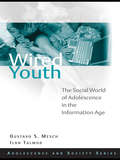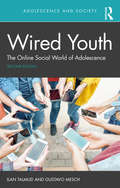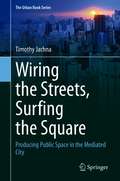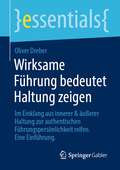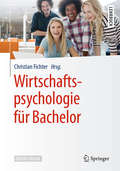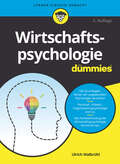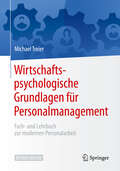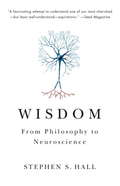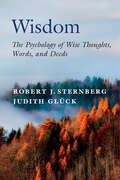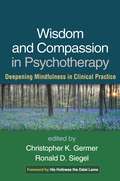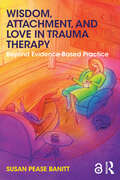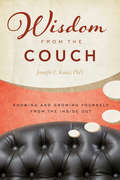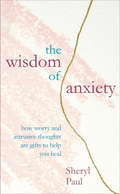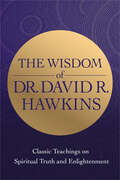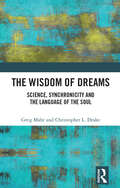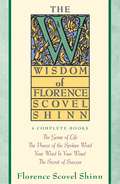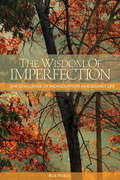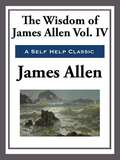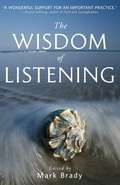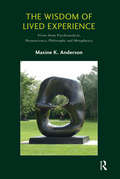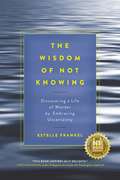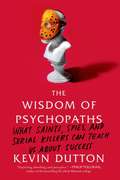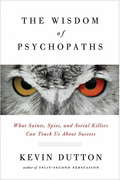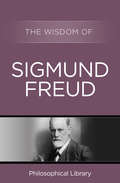- Table View
- List View
Wired Youth: The Social World of Adolescence in the Information Age (Adolescence and Society)
by Gustavo Mesch Ilan TalmudThe debate on the social impact of information and communication technologies is particularly important for the study of adolescent life, because through their close association with friends and peers, adolescents develop life expectations, school aspirations, world views, and behaviors. This book presents an up-to-date review of the literature on youth sociability, relationship formation, and online communication, examining the way young people use the internet to construct or maintain their inter-personal relationships. Using a social network perspective, the book systematically explores the various effects of internet access and use on adolescents’ involvement in social, leisure and extracurricular activities, evaluating the arguments that suggest the internet is displacing other forms of social ties. The core of the book investigates the motivations for online relationship formation and the use of online communication for relationship maintenance. The final part of the book focuses on the consequences, both positive and negative, of the use of online communication, such as increased social capital and online bullying. Wired Youth is ideal for undergraduate and graduate students of adolescent psychology, youth studies, media studies and the psychology and sociology of interpersonal relationships.
Wired Youth: The Online Social World of Adolescence (Adolescence and Society)
by Ilan Talmud Gustavo MeschThis fully updated new edition offers a research-based analysis of the online social world of adolescence, incorporating additional research findings that have appeared during the last decade. Talmud and Mesch take a realistic, sociological approach to online adolescents’ communication, demonstrating how online sociability is embedded in the larger social structure and in technological affordances. Combining perspectives from sociology, psychology, and education with a focus on social constructionism, technological determinism, and social networking, the authors present an empirically anchored review of the field. The book covers topics such as youth sociability, relationship formation, online communication, and cyberbullying to examine how young people use the Internet to construct or maintain their inter-personal relationships. This new edition also incorporates new research findings on online adolescents' behaviour in general, and specifically in relation to social apps, providing a more updated outlook regarding various dimensions of adolescents' online interactions. Wired Youth is essential reading for advanced students of adolescent psychology, youth studies, media studies, and the psychology and sociology of interpersonal relationships, as well as undergraduate students in developmental psychology, social psychology, youth studies, media studies, and sociology.
Wiring the Streets, Surfing the Square: Producing Public Space in the Mediated City (The Urban Book Series)
by Timothy JachnaThis book investigates the production of public space in contemporary urban contexts as conditioned by the suffusion of urban life with digital technologies. A “social production of technology” approach is taken to frame the digitally-mediated city as a communal social and cultural project. Acknowledging the multivalent and shifting nature of public space and the heterogeneity of the urban actors who form it, the “agency” of these different actors in appropriating digital technologies takes center stage. The dynamics of negotiations between regimes of control and impulses towards freedom and experimentation, the entanglement of the spatial commons and the digital commons, changes in the notions of what constitutes membership in a public or counterpublic, and evolving relationships between the various individuals and groups who share and constitute public space, are all revealed in different actors’ appropriation of digital technologies in the formation of public spaces and the conducting of public life in cities.The book is divided into two sections. Drawing on classic and contemporary scholars on public space, and on digital culture, Section I explores the implications of the convergence of these bodies of knowledge and lenses of critique and examination on the present urban condition, establishing a conceptual foundation upon which public space discourse is brought to bear on an interrogation of the “wired” or “mediated” city. Structured by the core concepts that underlie Hannah Arendt’s notion of agency in the constitution of the public sphere, Section II is devoted to discussing, and demonstrating through myriad concrete examples, how different “affordances” of digital technologies are implicated in the production of public space and in the interplay between urban governance and control, urban life and citizenship, and urban commodification. The topics in this book are of broad and current international relevance, and will appeal to scholars and students in architecture, urbanism, design, sociology, and digital culture.
Wirksame Führung bedeutet Haltung zeigen: Im Einklang aus innerer & äußerer Haltung zur authentischen Führungspersönlichkeit reifen. Eine Einführung (essentials)
by Oliver DreberDieses Buch ist eine Einführung in den Themenkomplex der Führung durch Haltung. Es bietet eine pragmatische Anleitung zur Selbstreflexion mit dem Ziel der Persönlichkeitsentwicklung. Theoretisches Grundlagenwissen zu Persönlichkeit & Führung wird mit neurowissenschaftlichen Erkenntnissen aus dem Embodiment und aktiven Körperwahrnehmungsübungen kombiniert. Ganz nach dem Motto des Autors: „Raus aus dem Kopf, rein in den Körper.“.Empathie, bedürfnisorientierte Kommunikation, aktives Zuhören, Integrität, Loyalität, Kreativität, Resilienz & Achtsamkeit sind nur einige der new work soft skills, die für erfolgreiche Führung immer bedeutsamer werden. Doch kaum einer wird mit all diesen Sozialkompetenzen geboren. Wir müssen uns diese im Laufe unserer persönlichen Entwicklung meist erst erwerben. Wenn wir das tun, bildet sich Schicht um Schicht eine individuelle Persönlichkeit. Im Zuge dieser Reifung entstehen auch unsere Haltungen. Eine Haltung ist nicht nur ein mentales Konstrukt (innere Haltung), sondern findet immer auch Niederschlag in einer äußeren Haltung (Körperhaltung). Erst wenn innere wie äußere Haltung miteinander korrespondieren, kann eine authentische und damit wirksame Führungspersönlichkeit entstehen.
Wirtschaftspsychologie für Bachelor (Springer-Lehrbuch)
by Christian FichterDie Wirtschaft ist heute nicht mehr ohne das Fachwissen der Psychologie zu verstehen! Dieses Lehrbuch gibt einen kompakten und doch vollständigen sowie praxisnahen Überblick über die Wirtschaftspsychologie. Es ordnet die Disziplin historisch ein und bietet eine ebenso kurzweilige wie interessante Darstellung aller relevanten Kernthemen. Durch viele Praxisbezüge, Definitionen, Lernziele, Kontrollfragen und Hinweise auf vertiefende Literatur ist es sehr lernfreundlich gestaltet, zusätzlich fasst eine ausführliche Randspalte das Wichtigste zusammen. Eine Begleitwebsite auf www.lehrbuch-psychologie.springer.com bietet zahlreiche Zusatztexte, Lern-Tools für Studierende sowie Dozentenmaterialien.
Wirtschaftspsychologie für Dummies (Für Dummies)
by Ulrich WalbrühlAuch in der Wirtschaft hängt der Erfolg in erster Linie von den Menschen ab. Somit ist die Psychologie die Wissenschaft der Wahl, für jeden der in der Wirtschaft erfolgreich sein möchte. Daher führt Ulrich Walbrühl Sie in die Wirtschaftspsychologie ein. Er erklärt Ihnen Differentielle, Allgemeine und Sozialpsychologie so, dass Sie sie auch ohne psychologische Vorkenntnisse verstehen werden. Auch praktische Anwendungen wie Personal-, Organisations- und Marktpsychologie kommen nicht zu kurz. So ist dieses Buch das richtige für Sie, egal ob Sie sich für das Studium, den beruflichen Alltag oder aus persönlichem Interesse mit Wirtschaftspsychologie beschäftigen.
Wirtschaftspsychologische Grundlagen für Personalmanagement: Fach- und Lehrbuch zur modernen Personalarbeit
by Michael TreierEine moderne Personalarbeit kann es sich in Anbetracht der Herausforderungen der Arbeit 4.0, des demografischen Wandels und Fachkräftemangels nicht leisten, Personal nur zu verwalten, denn der Mensch avanciert zum Potenzial- und Wertschöpfungsträger. Personalarbeit transformiert sich deshalb zum Gestalter mit dem erklärten Ziel, das organisationale Verhalten des Personals zielgerichtet zu beeinflussen. Personalmanagement und Wirtschaftspsychologie treten dabei als Gespann auf, um die knappen und wertvollen Humanressourcen im Spannungsfeld zwischen ökonomischen und sozialen Zielen zu erhalten und zu fördern. Viele „Nicht-Wirtschaftspsychologen“ im Personalbereich stehen vor der Herausforderung, psychologische Methoden und Instrumente in ihr Aufgabenportfolio zu integrieren. Dieses systematisch und didaktisch klar aufgebaute Fach- und Lehrbuch greift die Herausforderung auf, wirtschaftspsychologische Themen im Personalmanagement entlang der Wertschöpfungskette der Personalarbeit theoretisch fundiert und praxisnah zu platzieren. Auf jeder Station der Personalarbeit - von der Planung bis zur Freisetzung - werden Ihnen personalwirtschaftliche Grundlagen und wirtschaftspsychologische Bausteine vorgestellt, anschaulich erklärt und verknüpft. Zu den Herausforderungen der Zeit wie Digitalisierung, flexible Arbeitszeitmodelle und Wertewandel bietet es Ihnen hilfreiche Beispiele und Tipps. Zusätzlich gibt es Arbeits- und Informationsmaterialien Online zum Download.Die Zielgruppen Personalverantwortliche, Führungskräfte und Berater sowie Wissenschaftler und Studierende im Bereich Personalmanagement und Wirtschaftspsychologie, die Personal als wertschaffende Ressource wertschätzen. Der AutorProf. Dr. Michael Treier lehrt an der Fachhochschule für öffentliche Verwaltung NRW in den Bereichen Personal, Organisation und Psychologie. Sein Forschungsschwerpunkt liegt im Demografie- und Gesundheitsmanagement. Als Berater betreut er Unternehmen der Privatwirtschaft und Organisationen im öffentlichen Sektor.
Wisdom: From Philosophy to Neuroscience
by Stephen S. HallA compelling investigation into one of our most coveted and cherished ideals, and the efforts of modern science to penetrate the mysterious nature of this timeless virtue. We all recognize wisdom, but defining it is more elusive. In this fascinating journey from philosophy to science, Stephen S. Hall gives us a dramatic history of wisdom, from its sudden emergence in four different locations (Greece, China, Israel, and India) in the fifth century B. C. to its modern manifestations in education, politics, and the workplace. We learn how wisdom became the provenance of philosophy and religion through its embodiment in individuals such as Buddha, Confucius, and Jesus; how it has consistently been a catalyst for social change; and how revelatory work in the last fifty years by psychologists, economists, and neuroscientists has begun to shed light on the biology of cognitive traits long associated with wisdom--and, in doing so, begun to suggest how we might cultivate it. Hall explores the neural mechanisms for wise decision making; the conflict between the emotional and cognitive parts of the brain; the development of compassion, humility, and empathy; the effect of adversity and the impact of early-life stress on the development of wisdom; and how we can learn to optimize our future choices and future selves. Hall's bracing exploration of the science of wisdom allows us to see this ancient virtue with fresh eyes, yet also makes clear that despite modern science's most powerful efforts, wisdom continues to elude easy understanding.
Wisdom: The Psychology of Wise Thoughts, Words, and Deeds
by Robert J. Sternberg Judith GlückThe world is simultaneously facing many crises that humanity is failing to solve. Yet, at the same time, humans are smarter (with IQs on average thirty points higher than a century ago) and more knowledgeable (with the world's knowledge base at our fingertips), and scientific advances are accelerating. However, intelligence and knowledge are not enough: wisdom harnesses these strengths to serve the common good. Education is focused on acquiring knowledge, but schools would do better also to teach and test for the development of wisdom. To a lot of people, wisdom is an abstraction, but there is a growing body of scientific research into what wisdom is and how it works. This introduction sets out why wisdom is so important. Drawing on insights from psychology, philosophy, science, and common sense, this book provides a complete account of wisdom and how we can develop it throughout our lives.
Wisdom and Compassion in Psychotherapy
by Christopher GermerBringing together leading scholars, scientists, and clinicians, this compelling volume explores how therapists can cultivate wisdom and compassion in themselves and their clients. Chapters describe how combining insights from ancient contemplative practices and modern research can enhance the treatment of anxiety, depression, trauma, substance abuse, suicidal behavior, couple conflict, and parenting stress. Seamlessly edited, the book features numerous practical exercises and rich clinical examples. It examines whether wisdom and compassion can be measured objectively, what they look like in the therapy relationship, their role in therapeutic change, and how to integrate them into treatment planning and goal setting.
Wisdom, Attachment, and Love in Trauma Therapy: Beyond Evidence-Based Practice
by Susan Pease BanittWisdom, Attachment, and Love in Trauma Therapy focuses on the creation of the therapist as healing presence rather than technique administrator—in other words, how to be rather than what to do. Trauma survivors need wise therapists who practice with the union of intellect, knowledge, and intuition. Through self-work, therapists can learn to embody healing qualities that foster an appropriate, corrective, and loving experience in treatment that transcends any technique. This book shows how Eastern wisdom teachings and Western psychotherapeutic modalities combine with modern theory to support a knowledgeable, compassionate, and wise therapist who is equipped to help even the most traumatized person heal.
Wisdom, Attachment, and Love in Trauma Therapy: Beyond Evidence-Based Practice
by Susan Pease BanittWisdom, Attachment, and Love in Trauma Therapy focuses on the creation of the therapist as healing presence rather than technique administrator—in other words, how to be rather than what to do. Trauma survivors need wise therapists who practice with the union of intellect, knowledge, and intuition. Through self-work, therapists can learn to embody healing qualities that foster an appropriate, corrective, and loving experience in treatment that transcends any technique. This book shows how Eastern wisdom teachings and Western psychotherapeutic modalities combine with modern theory to support a knowledgeable, compassionate, and wise therapist who is equipped to help even the most traumatized person heal. Chapters: Chapters 2 and 3 of this book are freely available as a downloadable Open Access PDF at http://www.taylorfrancis.com under a Creative Commons [Attribution-Non Commercial-No Derivatives (CC-BY-NC-ND)] 4.0 license.
Wisdom from the Couch
by Jennifer KunstA useful guide to understanding the mysteries of the mind and how we can change for the better.How can it be that perfectly intelligent people do such obviously counterproductive things so much of the time? Why do we do the things we know we shouldn't do, and why do we fail to do the things we know we should do? The simple answer to these questions is that the unconscious mind greatly influences all that we do, and this is the basis for the psychoanalytic idea that insight leads to change.Written by an experienced clinical psychologist with a knack for describing complex ideas in a lively and easy to comprehend way, Wisdom from the Couch will change the way you think about your internal and external life. Jennifer L. Kunst, PhD is a clinical psychologist and psychoanalyst in private practice in Pasadena, CA. She is a senior faculty member at the Psychoanalytic Center of California in Los Angeles, where she has served as chair of the Curriculum and Continuing Education Committees. She is also an adjunct associate professor at the Graduate School of Psychology at Fuller Theological Seminary in Pasadena, California. She writes a blog on psychologytoday.com, A Headshrinker's Guide to the Galaxy.
The Wisdom of Anxiety: How worry and intrusive thoughts are gifts to help you heal
by Sheryl Paul'We have to shift from a mindset of shame, which sees anxiety as evidence of brokenness, to a mindset of curiosity, which recognizes that anxiety is evidence of our sensitive heart, our imaginative mind and our soul's desire to grow towards wholeness.' Three million people are thought to suffer from anxiety in the UK, and it is an issue that affects a growing number of people across all ages. For anyone troubled by obsessive thoughts, insomnia and other manifestations of anxiety, counsellor Sheryl Paul offers shelter in the storm. In The Wisdom of Anxiety, Paul reveals that anxiety, like any emotion, is a signal - a clear bodily invitation to heal and renew your trust in your choices, self-image and core values. Weaving together practical exercises with personal stories, Paul offers medication-free approaches for accessing the gifts in different kinds of anxiety, and especially the anxiety summoned by life's transitions, for example a career change, becoming parents or becoming carers for loved ones. Chapters include recognising the symptoms of anxiety, its origins, the myth of 'normal', the expectation of happiness and a timeline of healing that includes exercises for the body and mind. There are also chapters on parenting in an age of anxiety and the vulnerability of connection and relationships.
The Wisdom of Dr. David R. Hawkins: Classic Teachings on Spiritual Truth and Enlightenment
by David R. HawkinsA collection of profound ideas from one of the great spiritual thinkers of our generation.Praised by Mother Teresa and Dr. Wayne Dyer for his breakthrough research and innovative teachings on the human mind, Dr. David Hawkins took our understanding of spiritual truth and enlightenment to an entirely new level. A nationally renowned psychiatrist, physician, researcher, spiritual teacher, and lecturer, Dr. Hawkins was the founding director of the Institute for Spiritual Research Incorporated and the founder of the path of devotional non-duality. During his life, he devoted almost three full decades to understanding the potential of the human spirit. His exhaustive research led to techniques anyone can use to elevate their quality of life. In this authoritative work, readers will be brought to higher levels of awareness, control, and understanding. This book includes ten volumes of Dr. Hawkins&’s core teachings that are most beneficial and relevant to today&’s world, including his Map of Consciousness calibration process. The Ultimate David Hawkins Library also includes one of Dr. Hawkins&’s last lectures on the most valuable qualities for a spiritual seeker. Get ready to step off the ego path onto a more rewarding, fulfilling, and service-oriented journey of enlightenment. &“Perhaps the most important and significant information I&’ve come across in the past 10 years.&”— Wayne Dyer
The Wisdom of Dreams: Science, Synchronicity and the Language of the Soul
by Greg Mahr Christopher L DrakeThis fascinating and accessible book offers a comprehensive overview of dream interpretation theory and modern dream science, presenting an argument for dreamwork as a means to better understand emotional challenges and achieve personal growth. Bridging the gap between cognitive-behavioral therapies, psychoanalysis and depth psychology, the book explores topics like lucid dreams, end-of-life dreams, cross-cultural dream analysis and Freudian and Jungian models of dream interpretation. The authors offer a new model for better understanding dreams based on symbol formation, narrative structure and current neurophysiology, with the aim of reinvigorating the way we value dreams and their importance to individuals and society. The Wisdom of Dreams can be of great interest to analysts and therapists, including psychiatrists, psychologists, sleep researchers, social workers and counselors, as well as anyone interested in working with their dreams for greater personal clarity and self-understanding.
Wisdom of Florence Scovel Shinn: The Game of Life, The Power of the Spoken Word, Your Word Is Your Wand, and The Secret of Success
by Florence Scovel ShinnHere in one volume are the four collected works of one of America's most beloved and best-selling inspirational authors. In her classic best-seller The Game of Life, Florence Scovel Shinn reveals the timeless message that has helped thousands to solve their problems. You can create anything you want simply by aligning your thoughts and words with the perfect good that resides divinely within you. Combined with the powerful affirmation found in Your Word Is Your Wand and the stirring examples of real-life successes in the other two volumes, The Wisdom of Florence Scovel Shinn provides a complete guide for learning how to turn defeat into victory, lack into prosperity, fear into faith, and resentment into love.
The Wisdom of Imperfection
by Rob PreeceAs practicing Buddhists, why do we still have so many problems? This book bridges the disparity between spiritual growth and personal experience. Acceptance of imperfection is key to developing love and compassion in us, enriching our lives. Through our gradual unfolding towards innate wholeness, known as individuation, we learn to balance our Buddhist practice with psychological and practical realities. A fascinating look at the internal processes of the Bodhisattva path.
The Wisdom of James Allen
by James AllenJames Allen was one of our finest thinkers. In this 4 - in - 1 omnibus edition Allen show's you the power of positive thinking and a path to prosperity with dignity. These teachings are as timeless today as they were when they were written. Many of today's best sellers, such as The Power of Positive Thinking, Laws of Attraction, and The Science of Success, and The Secret owe a deep and abiding debt to these great works. Now you can read the words of the master. This edition includes: All These Things Added; The Life Triumphant: Mastering the Heart and Mind; From Passion to Peace; Light on Life's Difficulties; Through the Gates of Good, or Christ and Conduct; Poems of Peace.
The Wisdom of Listening
by Mark BradyThe benefits of practicing true listening are very real. Through refining our listening skills, we not only understand just what to say; we also understand when not to say anything at all. We become more open, present, and responsive. In turn, we renew the sense of peace within ourselves. And the effects on our romantic, family, and professional relationships are undeniable. In The Wisdom of Listening, award-winning author, teacher, and trainer Dr. Mark Brady and contributors that include Ram Dass and A.H. Almaas, help us to develop the "listening warrior" inside us all. Inspiring and easy to follow, the lessons here can transform the ways that we interact with others, whether in a large meeting or in a face-to-face encounter. Listening is almost a lost art: some of us may have forgotten how to do it; some of us may have never quite learned. The Wisdom of Listening gives readers the skills to overcome our culture's tendency towards distraction and reaction, and to be more fully in the world.
The Wisdom of Lived Experience: Views from Psychoanalysis, Neuroscience, Philosophy and Metaphysics
by Maxine K. AndersonIn our quest toward truth we often rely on the guidance and clarity of conscious thought, but in doing so we may bypass awareness of a more deeply informing resource, which is embodied in lived experience. This book highlights aspects of this deeper dialogue where neuroscience (McGilchrist's work on right- and left-brain dynamics, and Solm's emphases on the enlivening role of affect) and psychoanalysis (Freud, Klein, Winnicott, Bion, and others) verify the Hegelian dialectics that seem to underlie all living processes and perhaps all of Nature. Hegel's concept of Aufhebung embraces the creative negating transformations that carry forward what has gone before in new and evolving forms and structures. Becoming, as on-going lived experience, exemplifies this dialectic as it embodies the cycle in which the emergence of unconscious (implicit) intuition is externalized and clarified (made explicit) via conscious notation and thought to then be enfolded back (made implicit once again) into the newly enriched unconscious matrix that becomes the root for the next intuition.
The Wisdom of Not Knowing: Discovering a Life of Wonder by Embracing Uncertainty
by Estelle FrankelA deeply affirming exploration of the challenges and possibilities of the unknown--with meditations and exercises that can help transform the fear and uncertainty of "not knowing" into a sense of openness, curiosity, and bravery.For most of us the unknown is both friend and foe. At times it can be a source of paralyzing fear and uncertainty, and at other times it can be a starting point for transformation, creativity, and growth. The unknown is a deep current that runs throughout all religions and mystical traditions, and it is also the nexus of contemporary psychotherapeutic thought and practice and a key element in all personal growth and healing. In The Wisdom of Not Knowing, psychotherapist Estelle Frankel shows us that our psychological, emotional, and spiritual health is radically influenced by how comfortable we are at navigating the unknown and uncertain dimensions of our lives.Drawing on insights from Kabbalah, depth psychology, Buddhism, Christianity, Hinduism, and ancient myth, Frankel explores how we can grow our souls by tapping into the wisdom of not knowing. She also includes case studies of individuals who have grappled with their fears of the unknown and, as a result, have come out wiser, stronger, and more resilient. Each chapter includes experiential exercises and/or meditations for befriending the unknown. These exercises help convey how we must be willing to "not know" in order to gain knowledge and be able to bear uncertainty so we can be free to enjoy a healthy sense of adventure and curiosity.
The Wisdom of Psychopaths: What Saints, Spies, and Serial Killers Can Teach Us About Success
by Kevin DuttonIn this engrossing journey into the lives of psychopaths and their infamously crafty behaviors, the renowned psychologist Kevin Dutton reveals that there is a scale of "madness" along which we all sit. Incorporating the latest advances in brain scanning and neuroscience, Dutton demonstrates that the brilliant neurosurgeon who lacks empathy has more in common with a Ted Bundy who kills for pleasure than we may wish to admit, and that a mugger in a dimly lit parking lot may well, in fact, have the same nerveless poise as a titan of industry. Dutton argues that there are indeed "functional psychopaths" among us―different from their murderous counterparts―who use their detached, unflinching, and charismatic personalities to succeed in mainstream society, and that shockingly, in some fields, the more "psychopathic" people are, the more likely they are to succeed. Dutton deconstructs this often misunderstood diagnosis through bold on-the-ground reporting and original scientific research as he mingles with the criminally insane in a high-security ward, shares a drink with one of the world's most successful con artists, and undergoes transcranial magnetic stimulation to discover firsthand exactly how it feels to see through the eyes of a psychopath. As Dutton develops his theory that we all possess psychopathic tendencies, he puts forward the argument that society as a whole is more psychopathic than ever: after all, psychopaths tend to be fearless, confident, charming, ruthless, and focused―qualities that are tailor-made for success in the twenty-first century. Provocative at every turn, The Wisdom of Psychopaths is a riveting adventure that reveals that it's our much-maligned dark side that often conceals the trump cards of success.
The Wisdom of Psychopaths
by Kevin DuttonPsychopath. The word conjurs up images of serial killers, rapists, suicide bombers, gangsters. But think again: you could probably benefit from being a little more psychopathic yourself.Psychologist Kevin Dutton has made a speciality of psychopathy, and is on first-name terms with many notorious killers. But unlike those incarcerated psychopaths, and all those depicted in movies and crime fiction, most are not violent, he explains. In fact, says Prof Dutton, they have a lot of good things going for them. Psychopaths are fearless, confident, charismatic and focused--qualities tailor-made for success in today's society.The Wisdom of Psychopaths is an intellectual rollercoaster ride that combines lightning-hot science with unprecedented access to secret monasteries, Special Forces training camps, and high-security hospitals. In it, you will meet serial killers, war heroes, financiers, movie stars and attorneys--and discover that beneath the hype and popular characterization, psychopaths have something to teach us. Like the knobs on a mixing deck, psychopathy is graded. And finding the right combination of psychopathic traits, sampled and mixed at carefully calibrated volumes, can put us ahead of the game.
The Wisdom of Sigmund Freud (Wisdom)
by The Wisdom SeriesAn invaluable guide to Freud&’s terminology and work. Repression, ego, analysis, neurosis—the language of psychology permeates our modern vocabulary. The brilliant observations of Sigmund Freud form not only the basis for psychoanalysis but also much of our current understanding of the human condition. This essential and approachable guide offers an A-to-Z glossary of terminology defined in Freud&’s own words, including his diagnostic and treatment recommendations as well as his well-known works, including dream interpretation, the Oedipal complex, and the practice of psychoanalysis. This ebook features a new introduction, image gallery, and index of the Hebrew alphabet.
